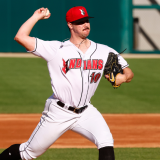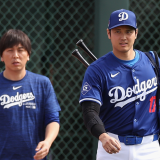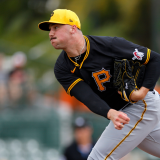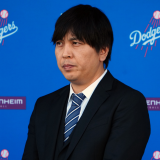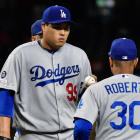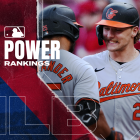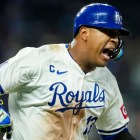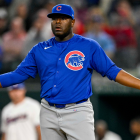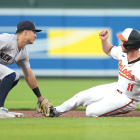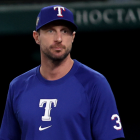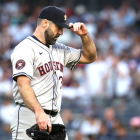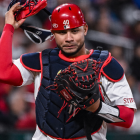The Los Angeles Dodgers enter their National League Division Series with the Washington Nationals as the overwhelming favorites to claim not just a series victory, but yet another pennant. Before that series gets underway, we wanted to preview it by offering six things to know about these teams and/or this match-up leading into what could be the best divisional series of the postseason.
1. The Dodgers have home-field, rest advantages
By virtue of having the best record in the NL during the regular season, at 106-56, the Dodgers will possess home-field advantage at least up until the World Series.
That isn't the only advantage the Dodgers have on the Nationals entering the series, either. Whereas the Nationals have essentially played for their postseason lives the past couple weeks, including on Tuesday, the Dodgers won the NL West by more than 20 games and haven't played a game with real consequences in -- well, a very long time.
That will change soon -- real soon, as it turns out. Here's a look at the full series schedule -- stream games via fuboTV (Try for free).
| DATE | MATCHUP | TIME (ET) | TV | VENUE |
|---|---|---|---|---|
Oct. 3 | Game 1: Washington at L.A. Dodgers | 8:30 p.m. | TBS | Dodger Stadium |
Oct. 4 | Game 2: Washington at L.A. Dodgers | 9:30 p.m. | TBS | Dodger Stadium |
Oct. 6 | Game 3: L.A. Dodgers at Washington | 7:45 p.m. | TBS | Nationals Park |
Oct. 7 | Game 4: L.A. Dodgers at Washington* | TBA | TBS | Nationals Park |
Oct. 9 | Game 5: Washington at L.A. Dodgers* | TBA | TBS | Dodger Stadium |
* - if necessary
2. The Dodgers took the regular-season series
The Dodgers and Nationals played seven times during the regular season. The Dodgers won four of those games, but did so by slim margins, outscoring the Nationals 30-27.
3. The Nationals might be better than their record suggests
It's easy to point to the differences in records and seeding and dismiss the Nationals as having no chance. But Washington is probably better than you think. After all, while the Dodgers led the NL in run differential, it was the Nationals who finished second. The gap between those two was sizable (274 versus 149), but it shows that the Nationals' record was skewed by a shaky bullpen, more so than a lack of talent or production.
4. Nationals' rotation is to be determined
One of the big questions facing the Nationals heading into the NLDS is how they'll order their rotation after using Max Scherzer and Stephen Strasburg on Tuesday. Patrick Corbin will go in Game 1, but from there the Nationals have a decision to make: bring back Strasburg on short rest after a 34-pitch outing, or defer to Anibal Sanchez instead?
Let's lay out what those two scenarios might look like:
With Strasburg on short rest:
G1: Corbin
G2: Strasburg
G3: Scherzer
G4: Corbin
G5: Strasburg, but really all hands on deck
With Strasburg on regular rest:
G1: Corbin
G2: Sanchez
G3: Scherzer
G4: Strasburg
G5: Corbin, but really all hands on deck
If there's good news for the Nationals, it seems likely that four of the five games will be started by one of their aces. The question is whether they try to push the envelope and make it five-for-five. We'll find out soon enough.
As for the Dodgers, they're expected to trot out some combination of Hyun-Jin Ryu, Walker Buehler, and Clayton Kershaw in the first three games. Should they require a fourth, they'd presumably turn to Rich Hill. As previously mentioned, the Dodgers will all be working on full rest.
5. The Dodgers have the advantage position-player wise
This should come as no surprise, but yes, the Dodgers have a loaded lineup -- even more loaded than the Nationals. The Dodgers exited the regular season with the top-ranked offense in the NL, according to FanGraphs' adjusted weighted runs created metric -- a catch-all that properly contextualizes ballpark -- while the Nationals ranked third. Meanwhile, the Dodgers tied the Astros for the best defensive efficiency -- that is, percentage of balls in play turned into outs. The Nationals were middle of the pack. The Dodgers also finished ahead of the Nationals as it pertains to catching framing. The Dodgers are good at baseball, you read it here first.
6. Bullpens could be X-factor
It's at least possible that the series boils down to whose bullpen can put more zeroes on the board. If so, the Dodgers would seem to have the advantage there as well.
The Nationals did all they could to avoid using the bullpen in the Wild Card Game, but when they did turn to their relief corps it's notable that it was Daniel Hudson instead of Sean Doolittle who received the call. (To be fair: Doolittle was warming and Hudson had been up-and-down for a few innings by that point.) Outside of those two, the Nationals will have to contend with which middle reliever to trust: Fernando Rodney? Wander Suero? Tanner Rainey? You can see why the Nationals, even after a midseason overhaul, ranked 29th in bullpen ERA.
The Dodgers ranked fifth, but Kenley Jansen had a worse-than-usual season and Joe Kelly has mostly failed to deliver on his promise. Even so, the Dodgers have the better bullpen on paper thanks to their depth -- folks like Kenta Maeda, Ross Stripling, Julio Urias, and even lefty specialist Adam Kolarek should tip the scales in L.A.'s favor. That's without mentioning someone like Dustin May, who could conceivably crack the roster.







